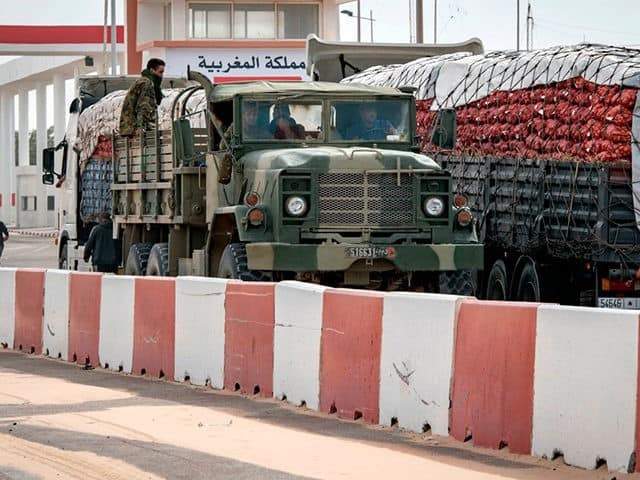Trump: U.S. Should Recognize Moroccan Claims over Western Sahara After Israel Accord

Soon after announcing the Moroccan government’s historic recognition of Israel on Thursday as part of his Abraham Accords initiative, U.S. President Donald Trump mused on Twitter that the United States should acknowledge Morocco’s claim of sovereignty over Western Sahara.
Trump’s tweet did not explicitly link this to the agreement with Israel, instead suggesting it would be a fair response for Morocco recognizing the legitimacy of the fledgling United States in 1777, but Reuters claimed Thursday that Western Sahara was indeed part of the deal Trump brokered with Moroccan King Mohammed VI.
The White House said as much in its statement on Trump’s conversation with the king:
The United States affirms, as stated by previous Administrations, its support for Morocco’s autonomy proposal as the only basis for a just and lasting solution to the dispute over the Western Sahara territory. Therefore, as of today, the United States recognizes Moroccan sovereignty over the entire Western Sahara territory and reaffirms its support for Morocco’s serious, credible, and realistic autonomy proposal as the only basis for a just and lasting solution to the dispute over the Western Sahara territory. The United States believes that an independent Sahrawi State is not a realistic option for resolving the conflict and that genuine autonomy under Moroccan sovereignty is the only feasible solution. We urge the parties to engage in discussions without delay, using Morocco’s autonomy plan as the only framework to negotiate a mutually acceptable solution. To facilitate progress toward this aim, the United States will encourage economic and social development with Morocco, including in the Western Sahara territory, and to that end will open a consulate in the Western Sahara territory, in Dakhla, to promote economic and business opportunities for the region.
Morocco was indeed among the first governments to officially recognize the United States, although many historians dispute claims that it was the first, as President Barack Obama stated after meeting with King Mohammed in 2013. Without getting too deep into that dispute, recognizing the legitimacy of a nation-state could be a complex and time-consuming process in the 18th Century. Morocco made the record books as the first nation to issue policies that implicitly accepted U.S. sovereignty.
Although the dispute is not widely known to Americans, Western Sahara has been contested between Morocco and an insurgent group called the Polisario Front since the 1970s. The Polisario Front largely consists of nomadic tribesmen called the Sahrawis, who were referenced in the White House statement on Trump’s discussion with the Moroccan king.
The Polisario Front began as a separatist insurgency against Spanish control of Western Sahara. After Spain withdrew and the territory was divided between Morocco and Mauritania, the Front adapted by declaring hostilities against both of them. Mauritania worked out a peace deal in 1979, but Morocco claimed sovereignty over the Western Saharan territory previously held by Mauritania, and a shooting war broke out between Moroccan forces and Polisario Front guerilla fighters.
The insurgents are supported by Algeria, which fought its own border war with Morocco in 1963. Relations between Morocco and Algeria remain tense to this day, despite strong historic and cultural ties between the two countries, in no small part due to Algeria’s support for the Polisario Front. About 40 percent of the Sahrawi population has been living in Algeria as refugees for decades.
A ceasefire agreement was signed in 1991, but hostilities have flared several times since then, most recently when Moroccan troops entered the U.N.-supervised “buffer zone” established by the 1991 agreement in November 2020. The leadership of the Polisario Front declared the 1991 ceasefire had been voided by this incursion and declared war on Morocco on November 14.
The Polisario Front seeks to create an independent Sahrawi Arab Democratic Republic and has pressed for varying degrees of autonomy from Morocco over the decades. Morocco resists because it believes it has ancient claims to Western Sahara, including some territory currently held by Algeria; it needs land transit routes through Western Sahara to work around the closed borders of Algeria; and because the region includes valuable phosphate deposits and fishing resources.
Despite popular imagination in other parts of the world, Western Sahara is not just a vast, trackless desert. The fishing industry is so large that it became the subject of a substantial trade dispute between Morocco and the European Union a few years ago.
The 1991 ceasefire agreement obliged Morocco to hold an independence referendum, but it has not yet done so. Trump’s declaration would make the United States one of the few nations to recognize full Moroccan sovereignty over the disputed area.
The United States and France, the other former regional colonial power besides Spain, have long opposed efforts at the U.N. to impose sanctions against Morocco to force the referendum. The U.S. and France instead prefer a limited autonomy solution for the Sahrawis that would come short of full independence.
The United Nations and International Court of Justice officially classify Western Sahara as a “non-self-governing territory,” which means “territories whose people have not yet attained a full measure of self-government.”
The Moroccan government, and Spanish officials, have accused some elements of the Polisario Front of developing ties to international terrorism, including the Islamic State in the Greater Sahara (ISGS) and al-Qaeda in the Islamic Magreb (AQIM). Some of the ISGS’ top military commanders were allegedly trained by the Polisario. Regional security analysts view the longstanding dispute over Western Sahara as feeding into unrest and jihadi terrorism across North Africa.
Photo: FADEL SENNA/AFP via Getty Images
Link: https://www.breitbart.com/africa/2020/12/10/trump-us-should-recognize-moroccan-claims-western-sahara-israel-accord/




